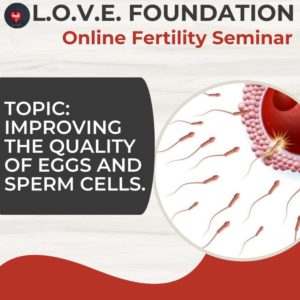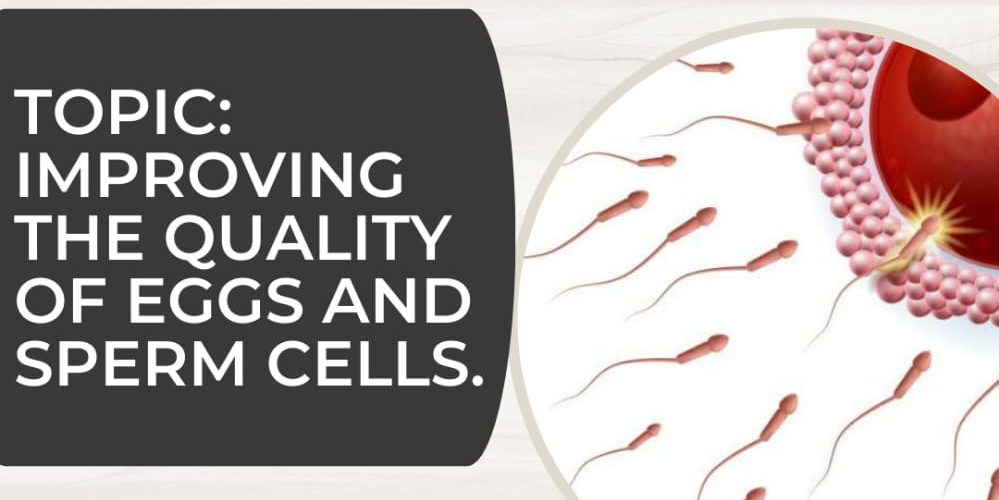Welcome to this lecture. Today we are talking about IMPROVING EGG AND SPERM QUALITY.
Before we talk about improving the quality of the sperm cells and eggs, let’s understand a few things about them.
For women, all the eggs are present at birth. A woman is born with about 1million eggs. For men, the sperm cells are produced in the testes only from puberty after the testicular tissue has matured.
For women, we have said there are approximately 1 million eggs at birth, but by the time of puberty, when the ovaries mature, only about 300,000 to 400,000 remain. Of these, only 300 to 400 will be ovulated during a woman’s reproductive lifetime.
What happens to the other roughly 260,000 eggs?
Each monthly menstrual cycle a number of follicles, each containing an egg, are selected to grow and mature. However, most of this group of follicles do not reach maturity but fade away. Each month, one or two follicles are selected and goes on to maturity. When this follicle has matured and grown to the right size the follicle ruptures and releases the egg, which is now ready to be fertilised. This is the process of ovulation.
So we can infer that fertility can drop as a woman ages due to decreasing number and quality of the remaining eggs.
In the man, the cells of the testes, once they achieve maturity, are programmed to keep producing sperm cells for life.
Along with age, a person’s biological family tree greatly determines their chromosomally normal or abnormal egg or sperm quality.
So we can comfortably say that the quality of the sperm and egg can lead to either a healthy conception or a failure to conceive. Once you are in your later 30’s and 40s, your egg and sperm quality unfortunately isn’t as high making ovulation and fertilization more challenging.
If you are trying to conceive (TTC), it’s important to know that good egg and sperm quality sets a solid foundation leading the way to a healthy pregnancy, and there are things you can do to boost your egg and sperm quality for optimal chances for conception.
So what are the other things that can diminish the quality of the eggs and sperm cell aside from age and the genetic factors we have mentioned?
▪️ Cigarettes: Smoking permanently speeds up egg loss in the ovaries and interferes with sperm cell formation.
▪Stress
▪️Poor diet
▪️Excessive weight
▪️Poor blood flow
▪️Alcohol consumption
▪️Exposure to chemicals like EDCs
What are the things you need to do to improve the quality of Reproductive cells?
These include:
1. Improve your blood flow
Oxygen-rich blood flow to the reproductive organs is essential for health of their cells. Blood flow can be improved by making sure that you stay hydrated with at least 6 to 8 glasses of fluid a day. Exercise also increases blood flow, as a healthy heart will help to provide optimal circulation everywhere in your body. Massage therapy and yoga can also help to improve blood flow.
2. Eat a healthy diet
Improving your overall health will also ensure that your reproductive cells stay healthy and what you eat and drink plays a big part in this. Studies show that nutrient-rich foods such as fruit and vegetables, fish and grains can help to support your fertility. As well as making sure your diet contains healthy foods, you need to avoid processed foods, saturated fats and excessive sugar and salt and ideally minimise your alcohol consumption.
3. Incorporate fertility supplements
Many fertility supplements contain strong antioxidants which can actually damage the quality of your reproductive cells. When choosing supplements, look for research-based supplements, clinically proven with strong evidence to support claims and superior ingredients which will be easily absorbed and processed by the body. If unsure, ask your Fertility specialists.
Important fertility supplements include; coenzyme Q10, fish oil (Omega/ cod liver oil). These supplements provide antioxidants to boost egg quality, support ovarian function and help you sleep better. Omega 3s preserve fertility and boost egg quality while Q10 provides antioxidants that support your mitochondria. This gives your body the energy it needs to perform DNA replication to increase high-quality egg production. Taking vitamin A boosts oocyte and spermatocyte quality and embryo development, while vitamin E lowers oxidative stress and boosts follicular blood supply (necessary for high-quality eggs). Also, B vitamins help with DNA synthesis as well especially for sperm production. Taking zinc can promote high-quality oocyte and spermatocyte development while adding a folate supplement boosts spermatocyte and oocyte quality, maturation, fertilization, and implantation.
4. Stop smoking
Studies have shown that smoking causes problems with fertility and leads to lowered fertility in the future. One of the reasons is that the chemicals in cigarettes can mutate the DNA in a woman’s eggs (making them unsuitable for conception) and speed up egg loss in the ovaries, as well as reduce production of sperm cells.
5. Maintain a healthy weight
A BMI of 25 to 29.9 means you’re overweight, and a BMI of 30 or above means you’re very overweight, or obese. Being overweight has been linked to decreased egg quality due to increased oxidative stress and alterations of mitochondrial function. You can lose weight through diet and exercise and this will not only increase your chances of getting pregnant but also avoid any problems associated with being overweight in pregnancy.
6. De-stress
Stress can produce hormones like prolactin and cortisol which can affect egg and sperm quality and production. Happiness and engaging in meaningful activities like making quality time for your family and friends can be really powerful in boosting your overall health. There are also activities which reduce stress such as meditation, taking walks etc. It is also important to prioritise time to relax, by taking naps, resting or scheduling-in long, warm baths. Massages can also help you to de-stress.
7. Get a good night’s sleep: Sleep is directly related to egg and sperm quality and fertility. It allows your body to fix cells, restore your energy and secrete hormones like melatonin. Melatonin is vital to reproductive processes so your body can develop high-quality, healthy reproductive cells as it supports oocyte and spermatocyte quality, ovulation and embryo development. This is especially helpful considering melatonin diminishes after 40.
8.Stay away from caffeine and alcohol: Both of these habits interfere with fertility function, so limit caffeine and avoid alcohol altogether to support your egg and sperm cell quality.
9. Freeze your eggs or sperm cells: If you know that you are not ready to have kids now and you are worried that age is not on your side, freezing the cells is one solution.
This is done to ensure their highest quality and chances of conception since their quality diminishes with age. You can counteract that by freezing your them now with cryopreservation so that they stay at the same level of health and quality as the day they were frozen!



Leave A Comment